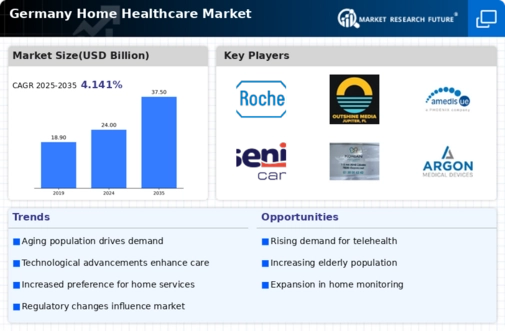Rising Healthcare Costs
The escalating costs associated with traditional healthcare services in Germany are driving a shift towards home healthcare solutions. With healthcare expenditures projected to reach approximately €500 billion by 2025, there is a growing emphasis on cost-effective alternatives. Home healthcare services often present a more affordable option for patients, as they can reduce hospital readmissions and minimize the need for extensive inpatient care. This economic pressure encourages both patients and healthcare providers to explore home healthcare market options that deliver quality care at lower costs. Additionally, the German government has been incentivizing home healthcare services through various funding programs, which further supports the market's growth. As a result, the home healthcare market is likely to expand as it offers a viable solution to the financial challenges faced by the healthcare system.
Aging Population Dynamics
The shift towards an aging population in Germany is a pivotal driver for the home healthcare market. As the proportion of individuals aged 65 and older continues to rise, the demand for home healthcare services is expected to increase significantly. By 2030, it is projected that nearly 25% of the German population will fall into this age category. This demographic trend necessitates a robust home healthcare market to cater to the unique needs of elderly patients, including chronic disease management and rehabilitation services. The increasing prevalence of age-related health issues, such as dementia and mobility impairments, further underscores the importance of home healthcare solutions. Consequently, stakeholders in the home healthcare market are likely to focus on developing tailored services that address the complexities associated with aging, thereby enhancing the quality of life for seniors in their own homes.
Shift Towards Preventive Healthcare
There is a noticeable shift in Germany towards preventive healthcare, which is significantly influencing the home healthcare market. This trend emphasizes the importance of early intervention and health maintenance, aiming to reduce the incidence of chronic diseases and hospitalizations. Home healthcare services are well-positioned to support this shift by offering regular health assessments, wellness programs, and education on lifestyle modifications. The focus on preventive care not only enhances patient outcomes but also alleviates the burden on the healthcare system. As more individuals seek to manage their health proactively, the demand for home healthcare services that promote preventive measures is likely to grow. This evolving paradigm suggests that the home healthcare market will play a crucial role in fostering a healthier population in Germany.
Technological Advancements in Care Delivery
Technological innovations are transforming the landscape of the home healthcare market in Germany. The integration of telehealth services, remote monitoring devices, and mobile health applications is enhancing the delivery of care to patients in their homes. These advancements facilitate real-time communication between healthcare providers and patients, allowing for timely interventions and improved health outcomes. For instance, the use of wearable devices that track vital signs can alert caregivers to potential health issues before they escalate. Furthermore, the German government has been actively promoting digital health initiatives, which are expected to bolster the home healthcare market. As technology continues to evolve, it appears that the home healthcare market will increasingly leverage these tools to provide efficient, patient-centered care.
Increased Awareness of Home Healthcare Benefits
The growing awareness of the benefits associated with home healthcare services is a significant driver for the market in Germany. Patients and families are increasingly recognizing the advantages of receiving care in a familiar environment, which can lead to improved emotional well-being and faster recovery times. Educational campaigns and advocacy efforts have contributed to this heightened awareness, highlighting the effectiveness of home healthcare in managing chronic conditions and providing post-operative care. As more individuals become informed about the options available to them, the home healthcare market is likely to experience increased demand. This trend suggests that stakeholders in the home healthcare market must continue to engage in outreach and education to further promote the value of their services.




















Leave a Comment